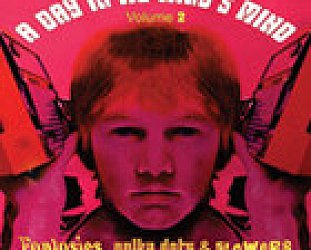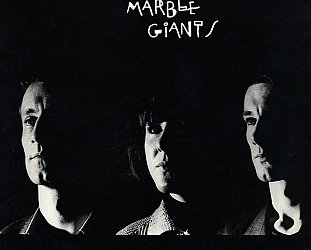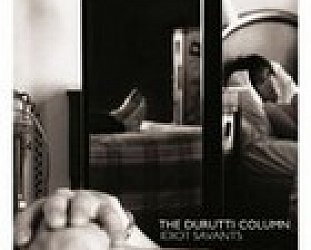Graham Reid | | 3 min read
The MC5: Teenage Lust

Writing against the tenor of these times, let it be said that sometimes there's no particular advantage in being first. Take Detroit's MC5. Essentially they made snotty, loud, politicised rock'n'roll. Like the Clash?
Sort of - except of their era, which was, unfortunately for them, the confusing period at the start of which Magical Mystery Tour coincided with the Velvet Underground, and the end of which Kansas was fighting it out on the charts with the Osmonds. Musically challenged times, we might say.
Politically, however, it was ripe with targets. MC5 took theirs as "Amerika". It was 1968 and revolution in the streets was that far away.
On paper they had it all, even for an audience thirtysomething years later if you believe the British and American critics writing celebratory articles to coincide with the release of this single-disc compilation The Big Bang! The Best of MC5.
But MC5 were of that time way before punk and hip-hop, and the musical landscape was very different. Some of their primal, occasionally sax-honk embellished, blue-collar rock'n'roll can be alarmingly underwhelming.
The Big Bang! kicks off with their early singles I Can Only Give You Everything, Looking At You and the B-side I Just Don't Know.
Terrific noise, but if they hadn't become politicised, they are a good argument that MC5 might simply have ended up on a Nuggets collection today alongside the Seeds, the Electric Prunes and the Sonics whom they sometimes sound like.
In their final years they threw funky r'n'b horns and their free jazz, noisecore inclinations into the mix alongside their garage punk, and sounded like an outtake from a John Lennon/Elephant's Memory Band session.
(If you get the reference, enough said. If you don't there's a part of Lennon's career you really don't want to know about, believe me.)
However, mostly MC5 provided bar-wrecking r'n'b rock and their heroes were Little Richard and Chuck Berry. Sheer visceral, uninhibited four-chord noise, and West Coast hippies hated them. As the Ramones would do a decade later, they sang knowing, adolescent pop (Teenage Lust, High School.)
Their politicised middle years, however, set them apart. Famously MC5 - which included Fred "Sonic" Smith, later to become "Mr Patti" - had manager/political mentor John Sinclair, whose White Panther party preached "dope and fucking in the streets," as he so eloquently put it.
Today various MC5 members talk about putting a bullet through Sinclair's brain for all the help he was.
Politically they were as relevant then as Atari Teenage Riot are now. Interpret that how you will.
As the Clash would do later, they adopted revolutionary poses (ammunition belts, insolent sneers) and they covered Chuck Berry's Back in the USA with the same affectionate understanding the Clash covered I Fought the Law.
Their finest moment was the live 69 Kick Out The Jams album. The title track came with the Oedipal Expletive, almost a year before Jefferson Airplane's equally expletive heavy We Can Be Together and 20 years before gangsta rap.
Revolutionary? In 69, you betcha.
Kick Out The Jams - four tracks of which form the centrepiece of The Big Bang! - is a classic live album alongside those by Dr Feelgood, the Stooges and Thin Lizzy.
But don't feel if bad you, unlike Famous International Rock Writers it seems, haven't heard Jams. Like Big Star, the Velvets and a dozen other bands from the period, MC5 suffered public indifference and abysmal albums sales. And, let's be honest, some scathing contemporary critical opinion.
In the furore following Jams they were dropped by their label, parted from Sinclair, and recorded Back in the USA with novice producer Jon Landau, who later became editor of Rolling Stone and discoverer of Bruce Springsteen Inc.
Back in the USA was a fine album, the evidence is the eight bristling tracks on The Big Bang!
There was another album (High Times, five tracks included on The Big Bang!) and that was it. MC5: 1965-72, RIP.
MC5 were of their period and unless your rock'n'roll taste is catholic, The Big Bang!, exciting and rowdy though it is, can sound woefully dated. Musically they were of that thread of AmRock which includes Bob Seger (American Ruse) and early Lou Reed (Shakin Street). Except with "anti-establishment" lyrics.
They went against the tenor of the musical, if not political, times and in some senses they were first. There just seemed no particular advantage in it.
Also at Elsewhere: Wayne Kramer of MC5 interviewed in 2004, and a review of DKT/MC5 live of the same year.
These Essential Elsewhere pages deliberately point to albums which you might not have thought of, or have even heard . . .
But they might just open a door into a new kind of music, or an artist you didn't know of. Or someone you may have thought was just plain boring.
But here is the way into a new/interesting/different music . . .
Jump in.
The deep end won't be out of your depth . . .







Gavin Hancock - May 19, 2011
Get "Kick Out The Jams", download the singles released prior and chuck the rest. Nothing after "Jams" could ever live up to such a monumental debut, all their albums should've been recorded live on stage. Some artists should just not be compiled, at least not in this manner.
Savepost a comment